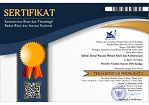Pandangan Tuan Guru Lombok terhadap multi akad dalam muamalah maliyah kontemporer
Abstract
Keywords
Full Text:
PDFReferences
Asmari al-, Salih bin Muhammad bin Hasan. Majmu’ah al-Fawa’id al-Bahiyah ‘Ala Manu'mah
al-Qawa’id al-Bahiyah. t.t.p: Dar al-Samî’i, 2000.
Badar al-Din Muhammad bin Bahard. Al-Bahr al-Muhit} fi Usul al-Fiqh. Beirut: Dar al-Kutub
al-Ilmiyah, 2000.
Baihaqi al-, Ahmad bin al-Hasan bin ’Ali bin Musa Abu Bakar, Sunan al-Baihaqi al-Kubra.
Makkah al-Mukarramah: Maktabah Dâr al-Bâz, 1994.
Baihaqi al-, Abu Bakar Ahmad bin al-Husain bin Ali. Al-Sunan al-Kubra. Hindi: Majlis Da’irah
al-Ma’arif al-Nizamiyah, 1344 H.
Baihaqi al-. Al-Sunan al-Kubra wa Zailihi al-Jauhar al-Naqy. Haidar: Majlis Da’irah al-Ma‘arif
al-Ni“amiyah,1344 H.
Bakker, Anton dan Ahcmad Zubair. Metodologi Penelitian Filsafat. Yogyakarta: Kanisius, 1990.
Fatwa Dewan Syari’ah Nasional Nomor: 26/DSN-MUI/III/2002 tentang Gadai Emas.
Fatwa Dewan Syari’ah Nasional No: 32/DSN-MUI/IX/2002
Freeman, Mihcael. Law and Sociology. New York: University Press, 2006.
Haitami al-, Ibnu Hajar. Al-Fatawa al-Kubra. Beirut: Dar al-Fikr, t.th.
Hambali al-, Shams al-Din Abi ’Abdillah Muhammad bin ’Abdillah al-Zarkasi al-Misri.
Al- Sharh al-Zarkashi ’Ala Mukhtasar al-Kharaqi. Beirut: Dar al-Fikr, 2002.
Hammad, Nazih. al-‘Uqud al-Murakkabah fî al-Fiqh al-Islami, Damaskus: Dar al-Qalam, 2005.
Hanafi al-, Zaid al-Din Ibn Nujaim. Al-Bahr al-Ra’iq Sharh Kanz al-Daqa’iq. Beirut: Dar al-
Ma’rifat, t.th.
Hanbal Ibn, Ahmad. Musnad al-Imam bin Hanbal. t.p.: Mu’assasah al-Risalah, 1999.
Hazm, Ibn Abu Muhammad Ali bin Ahmad bin Sa‘id. Al-Muhalla, Kairo: Dar al-Turath, tt.
Husain al-. Muhammad. Umdah al-Nazir ‘Ala al-Ashbah wa al-Naza‘ir. t.p.: t.t., th.
Husain. Al-Usul al-‘Ammah al-Jami‘a li al-Fatawa. t.t.: t.p, t.th.
Ibn Taimiyah. Al-Qawa‘id al-Nuraniyyah al-Fiqhiyyah. t.p: Dar Ibnu al-Jauziy, t.th.
Ibn Taimiyyah. Majmu al-Fatawa. t.t,: Dar al-Wafa’, 2005.
Imrani al-, Abdullah bin Muhammad bin Abdullah. Al-‘Uqud al-Maliyah al-Murakkabah:
Dirasah Fiqhiyyah Ta’siliyah wa Tatbiqiyyah. Riyad: Dar Kunuz Eshbelia li al-Nashr wa al-
Tauzi’, 2006.
Jauhari al-, Hasan. Buhuth fi al-Fiqh al-Mu‘asirah. t.t.: t.p., t.th.
Jaziri al-, Abu al-Sa’adat al-Mubarak bin Muhammad. Al-Nihayah fi Gharib al-Athar. Beirut:
al-Maktabah al-Ilmiyah, 1979.
Kaelan. Metode Penelitian Kualitatif Bidang Filsafat. Yogyakarta: Paradigma, 2005.
Manan, Abdullah. Aspek Hukum dalam Penyelenggara Investasi di Pasar Modal Syari’ah Indonesia.
Jakarta: Kencana Prenada Media Groupe, 2009.
Minhaji, Akh. “Zakat dalam Konteks Otonomi Daerah (Perspektif Sejarah Sosial Hukum
Ekonomi Islam)”, dalam M. Amin Abdullah, dkk., Tafsir Baru Studi Islam di Era Multi
Kultural. Yogyakarta: Kurnia Kalam Semesta, 2002.
Moleong, Lexy J. Metodologi Penelitian Kualitatif. Bandung: Remaja Rosda Karya, 1989.
Muhadjir, Noeng. Metode Penelitian Kualitatif . Yogyakarta: Rake Sarasin, 1996.
Multaqa Ahl al-Hadith. Al-Mu‘jam al-Jami‘ fi Tarajim al-Ulama’ wa Talabah al-‘Ilm al-Mu’asirin.
t.p.: t.t., t.th.
Musawar. Sandak Dalam Perspektif Tuan Guru (Studi Kasus di Lombok Nusa Tenggara
Barat. Yogyakarta: IAIN Sunan Kalijaga, Tesis, 2002.
Newman , Isadore and Carolyn R Benz. Qualitative-qualitative Research Methodology, Exploring
the Interactive Continum. USA: Sourthern Illinois University Press, 1998.
Salma al-, Iyad bin Nami. Usul al-Fiqh al-Lazi la Yasa‘u al-Faqih Jahluhu”. t.p.: t.t., t.th.
San’ani al-, Muhammad bin Isma’il al-Amiry al-Kahlani. Subul al-Salam. t.t.p,: Maktabah
Mustafa al-Babi al-Halabi, 1960.
Shanqiti al-, Muhammad al-Hasan al-Dudiy. Sharh al-Waraqat fi Usul al-Fiqh. t.p.: t.t., t.th.
Shuhud, Ali bin Nayif. Mausu‘ah al-Buhuth wa al-Maqalat al-Ilmiyah, t.p.: t.t., t.th.
Soehartono, Irwan. Metode Penelitian Sosial. Bandung: Remaja Rosda Karya, 1998.
Sulaiman, Ala al-Din Abi al-Husain Ali bin. al-Tahbir Sharh Fi Usul al-Fiqh. Riyad: Maktabah
al-Rushd,2000.
Suryabrata, Sumardi. Metodologi Penelitian. Jakarta: Raja Grafindo Persada, 1998.
Tabrani al-, Sulaiman bin Ahmad bin ‘Ayub Abu al-Qasim. Al-Mu‘jam al-Kabîr. Musha:
Maktabah al-Ulum wa al-Hukm, 1983.
Tahânawi al-, Kashshaf Istilahat al-Funun. Beirut: Dar Sadir, tt.
Taqi al-Din. Sharh al-Kaukab al-Munir. t.tp: Maktab al-Abikan, 1997.
Tim Penyusun. Kamus Besar Bahasa Indonesia. Jakarta: Balai Pustaka, 1996.
Turmuzi al-, Muhammad bin ‘Isa ’Abu ‘Isa. Al-Jami‘ al-Sahih Sunan al-Turmuzi. Beirut: Dar
Ihya’ al-Turath al-‘Arabiy, tt.
Turner, Brayan S. Social Theory. Balack Well Publishing, 2009.
Waza’ir al-Auqaf wa al-Shu’un al-Islamiyah. Al-Mausu‘ah al-Fiqhiyah al-Kuaitiyah. Kuwait:
Dar al-Salasil, 1427 H.
Wizarat al-Awqaf wa al-Shu’un al-Islamiyah. Al-Mausu’ah al-Fiqhiyah al-Kuwaitiyah. Kuwait:
Dar al-Salasil, 1427 H.
Yayasan Penyelenggara Penterjemah al-Qur’an. Al-Qur’a dan Terjemahnya. Bandung: Sinar
Baru Algensido, 2008.
Zuhailiy al-, Wahbah. Usul al-Fiqh al-Islami. Beirut: Dar al-Fikr, 1987.
DOI: https://doi.org/10.18326/ijtihad.v16i1.131-155
Refbacks
- There are currently no refbacks.

This work is licensed under a Creative Commons Attribution-ShareAlike 4.0 International License.
Ijtihad: Jurnal Wacana Hukum Islam dan Kemanusiaan by http://ijtihad.iainsalatiga.ac.id/ is licensed under a Creative Commons Attribution-ShareAlike 4.0 International License







